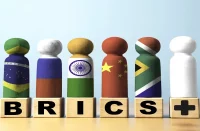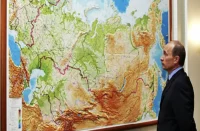As Germany and many other nations celebrate the 25th anniversary of the demolition of Berlin Wall, the event which symbolized the end of the Cold War, it is important to analyze why U.S. – Russia relations are presently at an even more confrontational state, and why Francis Fukuyama’s famously-proclaimed the “end of history” due to West’s triumphal victory over USSR was just wishful thinking by a great philosopher.
A recent poll in Russia has shown that 87 percent of Russians believe that Western criticism of Russia and Putin over Ukraine – and practically over everything else – is hostile, unfair, and eventually aimed at regime change in this country and at its ultimate ruin and disintegration.
It is nowadays hard to believe that a mere 25 years ago the situation was exactly the reverse. All Russia was in love with America and Europe, seen as an embodiment of all that was civilized, a world of human rights, democracy, and freedom; in short, the opposite of the totalitarian system imposed on the people by the Communist Party.
The Russians sincerely believed that the moment they threw off the Communist rule, they would be heartily welcomed into the family of free and democratic nations as equal partners in the new brotherhood of men.
Soviet president Mikhail Gorbachev and later Russian present Boris Yeltsin naively expected that Moscow would be quickly integrated into European economic and security structures, and judging from the public rhetoric of George H.W. Bush and some leaders of “old” Western Europe there was at least an impression that they were inclined that way.
 Bush’s declarations of a “new world order” and “new security arch from Vancouver to Vladivostok” was cheered by the Russians who were looking forward to a sort of Marshall Plan to help their country overcome the disastrous consequences of the disintegration process.
Bush’s declarations of a “new world order” and “new security arch from Vancouver to Vladivostok” was cheered by the Russians who were looking forward to a sort of Marshall Plan to help their country overcome the disastrous consequences of the disintegration process.
However, as Mary Elise Sarotte writes in LA Times, once-secret historical evidence shows that all these statements were just smoke and mirrors. In reality Bush, working closely with the West German chancellor, Helmut Kohl, “left Moscow on the political periphery of post-Cold War Europe by design.”
The consequences of that tragic decision signified a catastrophe for Russia — devastating economic decline worse than in World War II; collapse of education, science, health services, of the military; two Chechen wars; thousands of Western “advisers” helping implement criminal privatization of state assets; the IMF’s crude policies.
Russian oligarchs, some of them cheered by the West were grabbing not only economic and financial power, but also openly buying up politicians, wholesale and retail.
At the same time NATO was inexorably expanding toward Russia’s borders. Whole libraries of books have been written about the greatest robbery of the 20th Century which led to Russia’s ruin and degradation.
By 1998 the basic job of finishing off Russia appeared to have been done. Everything was ready for various parts of Russia to start the secession process, as local legislative assemblies passed thousands of local laws directly contravening federal ones.
This total decline culminated in the August 1998 financial meltdown, in Russia defaulting on its national debt. And there, in the teeth of it all, the very next year saw the turning of the tide, with Russia starting on the road to recovery and revival. This was so unexpected that it gave rise to talk of a miracle, of divine intervention even. However, a soberer thinker will simply turn to Russia’s history for an explanation of this phenomenon.
It is a fact that throughout its thousand-year-long existence, Russia went through cycle upon cycle of defeat and subjugation followed by fierce rebellion, victory, and revival. Over the ages, Russia suffered defeats at the hands of Mongols, Tatars, Poles, Swedes, Turks, Napoleon’s la Grande Armee speaking twelve languages, Hitler’s hordes backed by the might of entire collaborationist Europe.
Yet each of those onslaughts ended in Russia rising from its knees, pulverizing its enemies, and shaking off the consequences of temporary defeat.

All one can do about Western strategists failing to take into account the working of such an unfailing mechanism in this part of the globe is to deplore their lack of professionalism. Arrogance and contempt for the adversary are poor aids in the shaping of geopolitical strategies.
An inability to admit being in error is perhaps even worse. This – despite Russia’s oft expressed readiness to join the West as an equal partner in dealing with the numerous challenges and threats inherent in the current world situation.
In 2001, in the wake of the 9/11 atrocity, President Putin offered George Bush Jr. any help the U.S. might need to defeat the Taliban.
That help was accepted – but how was it repaid? What was the grateful response? Unilateral abrogation of the ABM Treaty; “color” revolutions throughout the post-Soviet space; further NATO eastward expansion, with the prospect of NATO military bases right on Russia’s borders, in Georgia and Ukraine.
Such prospects are bad enough, but the U.S. has done much worse. In 2008 it practically encouraged, then president of Georgia Saakashvili who is now a fugitive from justice, to start an assault on South Ossetia in which not only hundreds of innocent civilians died, but also Russian servicemen who were there by international mandate. That was an act of open aggression, and Russia reacted to it accordingly – by military force.
That lesson clearly was not learned by Washington and Brussels strategists. With their blessing President Yanukovich of Ukraine was overthrown in a coup and chased out of the country; a Russophobic government was installed in Kiev, ostentatiously supported by ultranationalist and at times openly Neo-Nazi sections of the population.
Well, a lot of good it has done Ukraine. The Crimea voted practically unanimously in favor of returning to the fold of Russia, of which it has ever been a part. Kiev’s attempt to crush the pro-Russian sentiment in Donbass has cost both sides thousands of lives, hundreds of thousands refugees fleeing mostly to Russia, and untold destruction and suffering in the South-Eastern Ukraine.
Presently, with the policy of severe sanctions which amount to open political, economic, and informational warfare against Russia, a totally unforeseen accident, a tiny spark, can trigger a global catastrophe with predictably horrifying consequences.
Unfortunately, the recent midterm U.S. elections which were obviously a win for GOP hawks make it practically impossible for Washington to admit that for its own good America should accept present-day realities – the fact that the time has run out for its uni-polar world supremacy and it is the time to start thinking instead of sharing the responsibility for global security with other regional players, definitely with the nuclear super power Russia.
The sooner U.S. foreign policy establishment realizes this the better for America and the rest of mankind.
Prof. Edward Lozansky is the President of the American University in Moscow.
Source Russia Insider














Pingback: The West’s Fatal Russia Mistakes: 1989-2014 #WakeUp http://orientalreview.su/?p=9061 | Protestation
Pingback: Steven25's Blog
Pingback: Putin’s popularity and leadership… | YERELCE